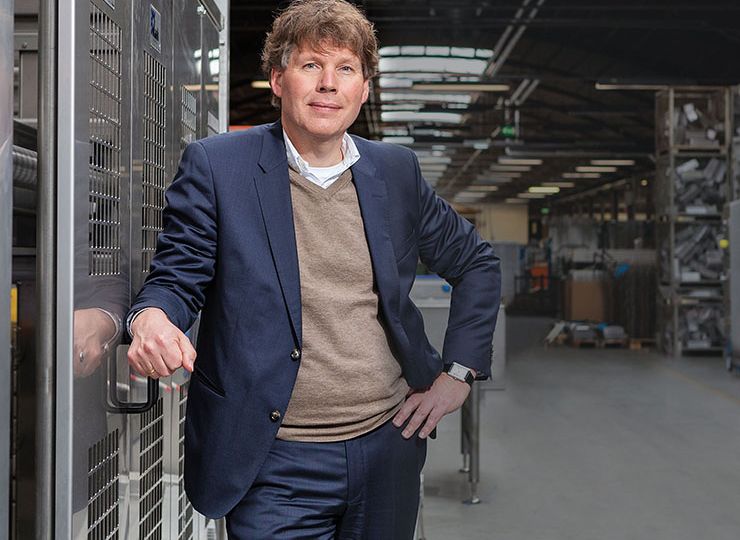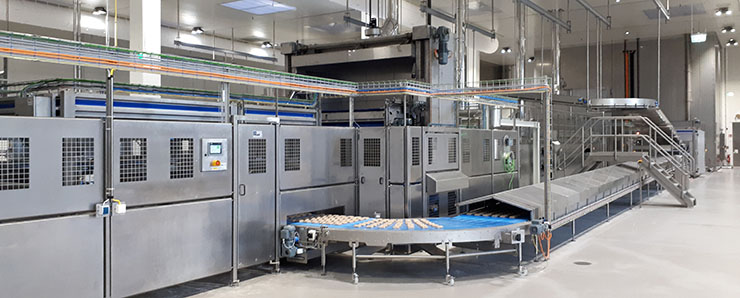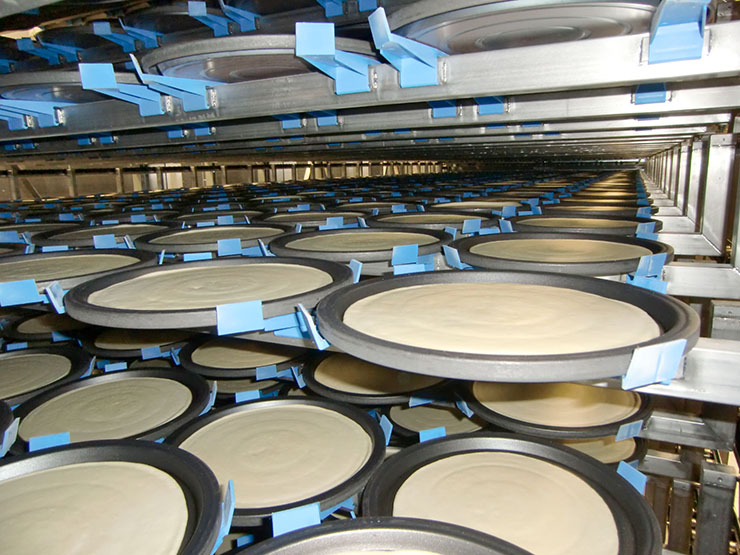
This spring, Aart-Jan Hartman, Chief Commercial Officer, celebrates 25 years with Royal Kaak. Here is a
glimpse into building a successful concept of vertical integration, the silver lining for better value offerings for the company’s markets, and the concepts around which Kaak builds its strategy.
Mihu: When we met last year, it was one of our first in-person meetings since the pandemic. Since then, the world has changed again. What are your thoughts on the recent events that upend lives – and work scenes?
Aart-Jan Hartman: We were well into the pandemic, but we were able to celebrate being granted the Royal title when we met, in October. It is, unfortunately, a completely different atmosphere today, indeed, the geopolitical setting is now entirely different than six months ago.
Mihu: How do these events impact Kaak and the industry?
Hartman: When the news was announced, we immediately checked in with our people in Russia. On the same day, we agreed that, under the current circumstances, we clearly could not continue to do business in Russia, and we stopped day-to-day operations there, which we mainly had in St. Petersburg and Moscow. We are not considering projects in Russia by choice, and we cannot discuss work in Ukraine at present, unfortunately. Elsewhere in the world, projects are advancing, ranging from production lines to entire factories. Despite concerns regarding the current situation, work continues, from the UK to Latin America, the U.S, Germany, the Netherlands, and Greece, to Romania and Poland or Switzerland, and the continent of Africa.
Currency fluctuations and availability of raw materials or energy (grain, gas, etc.) in specific regions determine our present attention to markets! A more direct impact is expected to be felt in the supply of wheat and grain coming from Ukraine and Russia. Thankfully, countries such as e.g. France, USA, Germany and the UK are still able to export, and several countries can immediately switch crops to start growing wheat; however, the availability will clearly not be the same in the coming months. Gas prices going up, along with those of raw materials, means that costs will increase significantly, while retail prices are fixed for bakers honoring ongoing contracts, for example.
“Decentralized production will be the name of the game for the next 20 years and we all need to adapt to this. Long-term sustainable models need to be put into place.”
Aart-Jan Hartman, Chief Commercial Officer, Royal Kaak
Reaching a milestone
Mihu: Looking at brighter moments, you are celebrating 25 years with Kaak this spring, which closely follows a landmark moment for Kaak – being granted the ‘Royal’ title. What does it mean for you? What is the significance of such an acknowledgment at this particular time?
Hartman: I am thinking about what we accomplished, what we didn’t, and what brought me the most satisfaction this whole time. Indeed, it all came together sometime in September last year, as we were announcing the Royal Kaak name change, and celebrating 175 years. There was a long path leading up to this. What makes me proud, today and every day, the same as 20 years ago, is the fact that we, a family company, were able to grow together with the bakers, to provide integrated solutions to our customers. We created this vertically integrated concept, which meant providing ‘from silo to truck’ solutions. We were able to remove barriers and provide bakery lines and entire factories. On the business side, I value the time we spent developing this, to value-engineer our products, and our control systems; to grow in companies, step by step, each specializing in a certain process. The latest addition was just as important as the first one we made, 20 years ago. By adding the team of Silowacht (today, Kaak Silos and Dosing), we grew in the expertise we can provide.
If I look back 25 years, this is the red line for me: being able to develop the concept of vertical integration, to work on it and, in the end, have a better value offering for our markets. I think that went well.
Looking at the type of company we are and my personal wellbeing in it, another important element is that we have always managed to remain a pragmatic family business. Even today, with 800-900 people, we know the names of the people at all Kaak companies. Not only that, we know what they do, why, and what their strengths are. Team-building has always been very strong, 25 years ago and now.
Mihu: And on a personal level, when was the moment when you decided Kaak was the company where you wanted to build your career? What determined your decision?
Hartman: 26 years ago, I was working for a company making robotic solutions for the packaging industry. I sometimes crossed paths with Kaak, and met the people, as the company would work on projects to transport baked goods. I learned Kaak was hiring a sales manager. The click was there, because the culture and the family feeling were evident. A long, long time ago I was born in a little village in the east of the Netherlands, Twello/Deventer and people there ‘tick the same way’ as in Terborg or Nieuwkuijk or Contres, Zwolle, Ala or Hamburg! I never regretted it, not for one moment; there have been difficult moments in the last 25 years; however, there has not been a single negative moment in the past 25 years. Of course, business-wise, there are always ups and downs in a company, but we have always found our way up again.
Putting things into perspective
Mihu: Looking back 25 years, what moments would you recall as turning points for yourself and Kaak, that helped shape the company into what it is today?
Hartman: On the business side, it is important to stick to what one does best. We are very good at what we do: we have an understanding of the bread and yeast markets, of fresh products, in general, and the visions in this sector, based on which we develop our machinery. Being able to recognize these things within our teams is what creates our success, while also being closely connected to the market. It is also fundamental that we always maintain the family atmosphere; there is not a lot of politics in our company, and we always work as a team. We very much nurture and strive to remain this way, a down-to-earth, pragmatic, pro-active organization. This is shown in opinions, behaviors, and beliefs.
In addition, the strategy of bringing added-value solutions is where our growth is coming from, the ‘silo to truck’ philosophy. We not only branded it, but we embraced and nurtured it – and it worked, 25 years ago and today. More so, it progressively works even better. That is something I am proud of.
Throughout all events that happened in the last 25 years, the most important thing has always been Kaak – the company, the people and the products, as well as the market – from project negotiation to line architecture, and the final products coming from our lines. Everywhere in the world, the product will always smell and taste great and nourish; it is loved and appreciated. Another important reason why I very much enjoyed working and have stayed in the industry for the last 25 years!

© Royal KAAK
Mihu: What are some meaningful moments putting your work into perspective?
Hartman: There are so many. One of the most important moments was the realization that we needed a clearly different philosophy than other components, machinery builders. Not to downplay their importance, as the strength of the line is determined by the power of its single components; but, our strategy came from our need to understand the necessity of strong components, through bringing them together in a system. The product we developed starting from the machine was their integration, the component architecture, the software architecture, the HMI structure, then the line or complete bakery engineering. When I started, we were in the process of taking over Daub, after we had just added Benier. Our growth accelerated from that point on. In this effort, it was essential for us to have a single control system of the line, one software
reflecting the architecture of all our companies. I am quite proud that we developed this software together, with input from our sales teams, marketing, product development, and specifically software/electrical engineering; a clear market-first 20 years ago.
Mihu: Which of your personal values are embedded into Kaak today?
Hartman: Recognize your market, go in-depth, determine the product and be close to the customer – these are the priorities I find essential that we follow, and they have helped us grow.
Mihu: What experiences come to mind, from your projects and travels?
Hartman: Some moments can change your view of the world; one of them was the 9/11 crisis. The entire business world was in the air, sitting in airplanes flying to the next agreement or meeting. A terrorist attack immediately resulted in all flights being halted and absolute chaos followed, with a lack of information adding to the confusion. My US Airlines flight, being off-radar for a couple of hours (which did not help the situation at home either), was stuck in Newfoundland for over a week. The little village of St John’s, with a population of just around 6,000 people, saw an influx of enough people to fill 25 airplanes, coming from all over the world, and all stranded there together. Being a part of this was an unfortunate life-
changing moment, seeing the full range of passengers’ reactions, and the people from Saint John’s mobilize. The few hotels on the island were immediately booked by airline staff and pilots, while still in the air, and there were clearly not enough ‘beds’ to host 6,000 extra people. However, the Red Cross, the Salvation Army, and village volunteers immediately organized army beds for everyone, in schools, in the University grounds and other places, in just one day. A few days later, flights started to resume, slowly. At that moment, not only did the whole world change, but I witnessed crisis behavior, ranging from anger, polarization to alliances being made, and solidarity. It put everything into a different perspective. All my thanks go to the University of St John’s, the Red Cross and the Salvation Army for taking such good care!
“We were able to remove barriers and provide bakery lines and entire factories.”
Aart-Jan Hartman, Chief Commercial Officer, Royal Kaak

© Royal KAAK
‘From silo to truck’
Mihu: What would be your favorite success story, in your shared timeline with Kaak?
Hartman: One of the most important moments was, for me, the development of the concept ‘from silo to truck’, which was the start of substantial projects in all parts of the world (this being ‘a product’ in itself). We developed strong, enormous, beautiful projects, worldwide; the common denominator to all of them has been this philosophy.
Second is the integration of Robotics in the baking lines, especially important given the lack of manpower and the need for the utmost hygiene to operate bread production lines all over the world. With robots, there is no need for human hands to ever come into contact with the product.
Thirdly, being able to always adapt our product to our customers’ needs is essential. Everywhere, always. We have brought ideas, technology and even final products from all over the world, to all over the world!
Mihu: What are the challenges in building this concept, ‘from silo to truck’? And how are they coordinated?
Hartman: It is extremely important to recognize what you have, what your strengths are, and what you lack, and you do not excel at, respectively. The last two are especially important. Innovation has to start with a market analysis and assessment of what we can provide and what we do not have in our portfolio. If there is an important element that, according to our ‘silo to truck’ philosophy, is missing, we identify it, do the market research, get feedback from the market, then proceed to make or buy it. When we consider acquiring a new company, we look very closely at its culture and its people to evaluate not only how its products fit into Kaak’s portfolio, but also to make sure the culture matches the family environment we have been nurturing.
Mihu: In this regard, what made Silowacht a good fit?
Hartman: Our latest acquisition is a perfect example: their culture matches the one at Kaak perfectly, we are the same type of people. Silos were a product category missing in our integrated solutions, as well as the distribution techniques from the silos to the mixers. These factors gave us the green light to start negotiations. In addition, the momentum was there as well, as Silowacht was also interested to be integrated and wanted to benefit from the strengths behind a bigger company.
Mihu: What key policies do you have in place? And what recent changes have been made to them?
Hartman: We reinforced project management over the last 2-3 years, ensuring supply chains, cost levels, and product quality. We remain very open-minded regarding opportunities on the market, but we are also very critical in evaluating them. In addition, safeguarding and improving existing assets is also among the things we do very well. Aligning these gives us the strength for our next move, and there are absolutely more to come, following the integration of Silowacht. There could be opportunities in the pizza production chain, for example – after baking, and in the bread market. This is what we do well and also what I like to do, personally, in our ‘silo to truck’ philosophy.
Mihu: How is Kaak preparing itself for such unpredictable events?
Hartman: Our reaction regarding the COVID-19 pandemic measures could be a good example. We did not have any decline in turnover during the two years of restrictions; on the contrary. There were several reasons for this outcome: we had people in each market, for that market. We could always travel within countries, and having service, installation and sales people locally has been a tremendous help. We already knew this, but it was an important lesson, which confirmed the importance of having companies all over the world.
The center we created in Terborg to manage working at a distance was a great success, with all the technical support available today from the Netherlands, working 1:1 with installation teams abroad. We will head towards more decentralized (in the country, for the country) ways of doing business, fortunately, or unfortunately. We are seeing this with pharma, computer chips, energy and we will see it in the food industry. Decentralized production will be the name of the game for the next 20 years and we all need to adapt to this, as it tackles issues such as transport costs, CO2 emissions, employee availability, the need for quick local response on a problem, and much more.
Mihu: Thank you for an interesting conversation.


